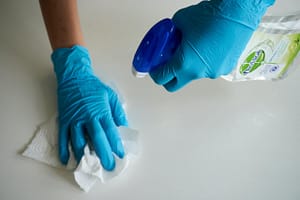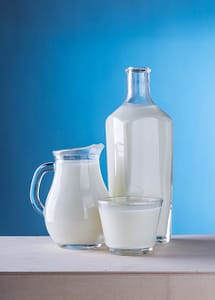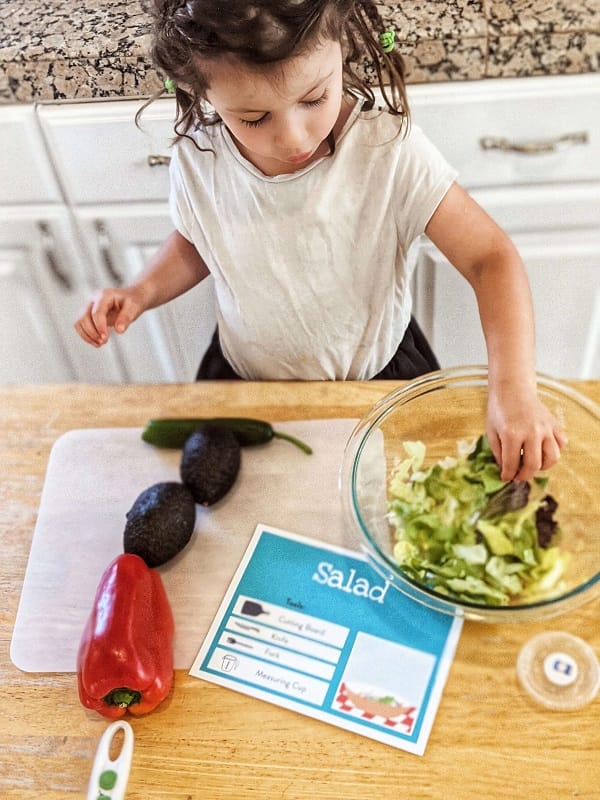How clean is your kitchen, really? I’m not talking about the spills on the counter top, or the crumbs on the floor. I’m talking about germs. Kitchens are one of the dirtiest rooms in our homes! But, never fear! Here are 3 things you can do to help keep your kitchen clean even when you cook with your kids.
Wash your Hands
There are so many great videos of proper hand-washing, and they should be applied to working in the kitchen too. You want to use soap and water and scrub for at least 20 seconds. It’s always a good idea to wash your hands in a sink that’s not also used for dishes. Keeping the germs off your hands is a great start to keeping them out of your kitchen. And you’ll probably want to wash your hands more often than you think.
BEFORE. This means before you come into the kitchen, your hand should be clean. It’s so tempting to open the fridge and start thinking about what to make for dinner and then begin grabbing the necessary ingredients, but don’t. In order to maintain a sanitary kitchen, the best time to wash your hands is before you start touching things in the kitchen.
AFTER. After you touch anything that may contaminate your hands, you should re-wash them. This includes the obvious ones, like going to the bathroom or blowing your nose, but it also extends to the less obvious ones, like scrolling through that recipe on your phone! (Yes, your phone screen is probably dirtier than you think.)
All of that hand-washing can take a toll on your skin. Cracked skin can actually be a great hiding place for bacteria (and also it’s just really uncomfortable.) So you should also be moisturizing to make sure you avoid dry hands.

Sanitize your Kitchen Surfaces
A well used kitchen gets dirty. One of the inevitable parts of cooking is of course, the clean up. But cleaning up is important, especially to avoid festering germs.
Scrub down your surfaces. This means stove tops, counter tops, and sinks. The important thing is to wipe up spills, collect those particles that have somehow escaped off the cutting board, and generally remove all the dirt and stuff that magically accumulates while working in the kitchen. It’s always a good idea to keep your counters clean (aka not as storage) for mail, homework, magazine or anything else that’s not food related. After your surfaces are clean, then you can sanitize. This is especially important if you’re using ingredients that may harbor bacteria, such as raw meat or fish.
Don’t forget the sink. Even though it may seem counter-intuitive, sinks do get dirty. All of the dirt you’ve been washing away is gathering in your sink. When you’re done cooking and washing dishes, it’s important not to forget the kitchen sink

Store your Food Properly
So *someone* left the milk on the counter after breakfast. Do you need to throw it out? How long can food stay out of the fridge? Here’s a quick summary to storing food safely in your kitchen.
Storing leftovers – If your leftovers are properly wrapped, then you can leave them in your fridge for about a week. That means they’re sealed up in a container. Or tightly wrapped in something. It’s not a good idea to leave things uncovered in the fridge for too long. Can you leave it in a pot with a lid? Sure, but a week is a long time to go without that pot!
Storing Produce – If it grows outside, it probably doesn’t need to be refrigerated. Once something is peeled, or sliced though, into the fridge it goes. If the juice part is exposed to air, then it becomes a playground for bacteria. So whole tomatoes are perfectly happy on the counter, but sliced tomatoes need to be refrigerated.
The Forgotten Foods – It’s happened to all of us. You’re in a rush and somehow that carton of eggs just never made it back into the fridge. Never fear! A good rule of thumb is that cold items can stay out for 4 hours. Unless they start smelling or looking strange. Hot items, like soup, should also be safely stored in the refrigerator after 4 hours.

Beware of These Traps
It’s a lot easier to face the enemy we can see. Don’t forget about these sneaky places that bacteria love to hide.
Rings. While plain, solid wedding bands get pretty clean with good hand washing, diamonds and other stones are more problematic. You’re actually not allowed to wear jeweled rings in kitchens, because they tend to carry bacteria. So before you start making dinner, make sure you’ve stored your rings in a safe place. Removing rings is an overlooked part of keeping your kitchen sanitary.
Sponges. I’m used to changing out sponges every shift. Sponges are basically like a resort for germs. They’re warm and damp and constantly in contact with all sorts of dirty things. For that very reason, a dishwasher is a great (and easy) alternative to washing dishes by hand. Or you could use a plastic sponge, which can dry.
Cutting Boards. These things tend to get scratches and nicks, which means places for bacteria to hide out. You should always wash your cutting board with soap and water and you can even use a little bleach to completely disinfect any lingering germs.
TL;DR
Yes, kitchens can get dirty, but with a little planning and some good old fashioned soap you can make sure your kitchen remains clean and sanitary.

